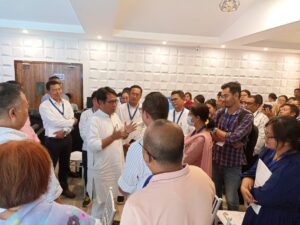Speaking at the inauguration, Health & Family Welfare Minister Dr Sapam Ranjan Singh announced that ECHO India has confirmed to establish two well-equipped telementoring Hubs in Manipur within the next 60 days
TFM Desk
Health & Family Welfare Minister Dr Sapam Ranjan Singh inaugurated two-day for Manipur’s senior health officials in Imphal on Tuesday. The training was organised by ECHO India, a non-profit organisation revolutionising healthcare access and healthcare education across the country, in collaboration with National Health Mission (NHM) Manipur. It aimed at apprising the state’s health officials about ways to effectively implement ECHO’s ‘hub and spoke’ model of capacity building to further strengthen the state’s health system, said an official.
Other key dignitaries present at the Immersion included Dr. Somorjit Ningombam, State Mission Director, NHM Manipur and Dr. Y. Premchandra Singh, State Nodal Officer, NCD, NHM Manipur.
Speaking at the inauguration, Dr. Sapam Ranjan Singh said, “The Health and Family Welfare Department, Government of Manipur, is constantly working towards its mission of ensuring equitable and accessible healthcare to all, especially the underserved population.”
“The strengthening of our state’s healthcare system can be brought forth by empowering medical professionals, including doctors, nurses, and Medical Officers (MOs), to upskill themselves and enhance their knowledge of recent developments in treatment protocols and medical knowhow,” he added.
The minister further said, “As our country continues to fight the COVID-19 pandemic and its challenges, capacity-building initiatives are now more important than ever, and owing to technological advancements; digital healthcare services are acting as enablers.”
He announced that ECHO India has confirmed to establish two well equipped telementoring Hubs in Manipur within the next 60 days. “Based on program evaluation and need analysis, three more hubs are planned to be opened within the next one year. This will bring the number of total ECHO hubs in Manipur to six as one hub is already operational and working for the capacity building of NTEP Staff,” the health minister added.
Dr. Somorjit Ningobam, MD, NHM Manipur, said, “Today, the right utilisation of technology can be quite beneficial for knowledge dissemination, and ECHO India’s capacity-building programs based on the ECHO Model are an excellent example. The sessions make information easily accessible and learning all the more insightful for healthcare workers. The comprehensive capacity-building programs facilitated by ECHO India have been a great learning opportunity for our healthcare workforce, allowing them to offer quality care and treatment to patients”.
Talking about ECHO’s work in Manipur, Dr Haresh Chandwani, General Manager of Projects at ECHO India said, “Our collaborations in Manipur have always been geared towards strengthening the state’s healthcare infrastructure. To date, ECHO India has partnered with State Tuberculosis Cell (STC) Manipur and the Manipur Nursing Council, with the initiatives being focused on Tuberculosis treatment and Infection Prevention and Control (IPC).
“Both these partnerships are a unique example where ECHO India played a critical role as a catalyst as well as an enabler for health system strengthening, contributing to the capacity building of 700+ healthcare professionals,” he added.
these partnerships are a unique example where ECHO India played a critical role as a catalyst as well as an enabler for health system strengthening, contributing to the capacity building of 700+ healthcare professionals,” he added.
The official said that ECHO India which was established in 2008, is a non-profit organisation focused on bringing equity, primarily in the fields of healthcare and education through capacity building of healthcare practitioners and educators using ECHO’s ‘Hub and Spoke’ Model of learning; Hub being a group of experts who regularly mentor the learners (spokes).
TeleECHO sessions are conducted by ECHO ‘hubs’ through basic, widely available teleconferencing tools, and the sessions involve primary care clinicians and healthcare workers (HCWs) from multiple sites presenting patient cases to teams of specialists and each other. In this manner, ECHO creates ongoing learning communities to support primary care clinicians and helps them develop necessary skills. This continuous loop of learning, mentoring and peer support makes the ECHO model unique and ensures a long-lasting impact.
With a goal to touch 400 million lives in India by end of 2025, ECHO India has partnered with the Ministry of Health and Family Welfare (MoHFW), Government of India, State NHMs (National Health Missions), Municipal Corporations, Nursing Councils as well as leading medical institutions across India including AIIMS (All India Institute of Medical Sciences), NIMHANS (National Institute of Mental Health & Neurological Sciences), NITRD (National Institute for Tuberculosis and Respiratory Diseases), NICPR (National Institute of Cancer Prevention & Research), Tata Memorial Hospital, and PGIMER (Post Graduate Institute for Medical Education & Research).
ECHO India, along with its partners, has launched over 200 hubs and rolled out 350+ programmes covering more than 30 disease areas, which has led to the capacity building of over 700,000 providers across the country, said the offical.
